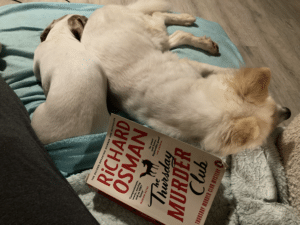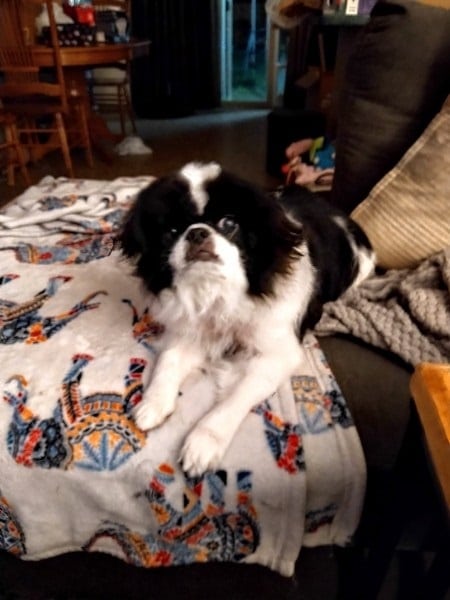
I usually edit as I type, and as I typed this sentence, my mind had already found fault with its obvious flaw before I typed the words in my head. But then I kept typing, because how obvious is it, really? (How many of you chuckled at the thought of a chicken standing up in the kitchen? Probably nobody.)
Okay, sorry. I was telling a story, then swerved to avoid a squirrel. Drives my husband crazy. But he’s the King of Tangential Storytelling, so he can’t complain. (Although he still does, sometimes.)
Anyhow, I like to watch TV while I eat. (Don’t judge. You know you do it too.) And while my critters beg, at least they beg from two feet away. But these two spoiled granddogters of mine salivate over my food from only a foot away, and they keep edging closer as I slant sideways until I’m finally perching on the edge of the couch, facing the wall, cradling my plate the way a tripped quarterback clutches the ball.
Then there’s this kitten who hasn’t yet learned his manners. He’ll jump directly into my plate if he can get close enough fast enough.
So, I ate that cold standing-up chicken in the kitchen so I wouldn’t have to sit on the couch and defend my plate against all these hooligans.
I’m always scared when I write. I’m scared I’ll accidentally use a word that I’ve heard all my life and never thought twice about, then find out that its origins are offensive. (This has happened to me before, more than once.)
Even the word gypsy is off-limits (did you know that?) but how else can you describe a full, swirly, calf-length skirt made of patchwork fabric without using the word gypsy as in gypsy skirt, without going into way too much detail to describe something that isn’t really all that important to the story, but quickly paints a vivid picture? I mean, how many gypsies do you know who are concerned by the possibility that they may be wrongly profiled as the inventors of a particularly beautiful garment that has endured through several centuries of fashion?
God, I love run-on sentences.
So anyway, I wrote hooligan (four paragraphs ago), but I was prepared to delete it and find something more appropriate that wouldn’t quite hit the mark but might be close enough. But when I looked up etymology hooligan, I found that the word surfaced around 1890, and its origins aren’t clear, but somebody theorized that it might be a mishmash of the Irish name Houlihan and some other word I’ve already forgotten.
And I’m sorry if I’m giving you whiplash.
But you know, as a writer, I’m kind of tired of tiptoeing around and trying to tell a story using only half of my vocabulary, then going back and taking out a good quarter of what I’ve written because it’s confusing or redundant or unintentionally offensive, then going back again and building bridges between sections and clearing the path of the story and trimming off the tangents so the reader won’t get lost. Also, readers want to read a story that’s been told using the least possible number of words, because they’re too busy to meander. Get to the point. Get in, tell the story, get out.
But hell, what if I’m tired of being so damn careful? What if I don’t want to lead readers along step by step anymore? Because it has come to my attention that it’s okay to break the rules if you do it well enough. I’ve known that. But up until now, it’s been easier to just learn and follow the rules.
Maybe now that I’m old and decrepit but still able to think and type, I want to learn how to break the rules well enough to get away with it.
I’m all inspired because of a book I just read, because the author does this stream-of-consciousness thing for each of the characters. It’s a multi-POV book, so you get insights into each character’s deep point-of-view, including the way their minds jump about. It’s sometimes hard to keep up with which character’s POV you’re in, and I wonder, as a writer, how to get around that problem. I mean, a writer should create a distinct voice and manner and way of thinking for each character, of course. But this book has tons of characters, more than I’m comfortable with as a reader and as a writer. Maybe I’ll get better at it on both counts. It is, after all, a new trend worth learning about.
One problem may be that I haven’t really been reading much, at all, for the last few years.
- I haven’t had time.
- I’ve become a news junkie. The last eight years have been such a train wreck, and you know how hard it is to look away when a horrible accident is unfolding in slow-motion right in front of you, and it’s only a matter of time until a minivan spins through the air like an errant football and lands on top of you. You have the feeling that you should be vigilant.
- I read with a highlighter pen and a G-2 .05 in my hand, so I can highlight passages and take notes when the writing is impressive. That takes some of the fun out of the reading experience, but the writer-me is in hog heaven.
I know I should read more, and I have made the commitment to make a commitment to read someone else’s writing every day. And also to write some of my own words every day. I have been reading, and right now, I’m writing this. So, that counts as a good day, even though I have avoided even looking at my to-do list.
But back to the book that I wanted to tell y’all about. It’s The Thursday Murder Club by Richard Osman. I’ve been dissecting it as I read, which as I’ve said takes some of the joy out of it. But I very much enjoyed the author’s clever word choices, quirky characterization, and the way that the characters’ wandering minds tantalize the reader with snippets of thought that serve as backstory or foreshadowing and then disappear just as quickly as they appeared. It’s a book worth reading. And I wasn’t desperate to get to the end and find out how the book ended, either. I was never in danger of bingeing until 3 a.m. I was happy to read a bit, follow the author and characters along their meandering path, then close the book and forget about it for a while.
It’s a whole new way of thinking about reading and writing that I’m eager to explore, and I’ve got a whole pile of TBR books ready for me to crack them open.
I’ll keep y’all posted as the adventure unfolds.










